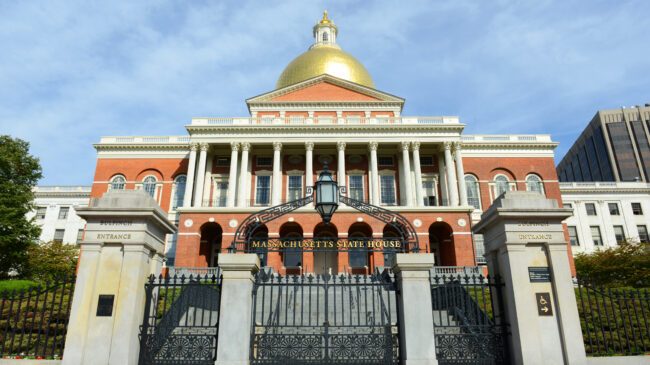A version of the following public comment was delivered to the Massachusetts Joint Committee on the Judiciary.
Reason Foundation is committed to, among other things, ending the drug war and allowing discerning adults to safely and responsibly partake in substances they believe may enhance their life. Decades of academic research combined with the emerging results of large-scale clinical trials have shown that psychedelic substances, which have been used within many cultures from antiquity, may hold substantial value for improving mental health.
Over the past few years, the U.S. Food and Drug Administration (FDA) has recognized psychedelic substances as “breakthrough therapies” for post-traumatic stress disorder, major depressive disorder, and treatment-resistant depression. According to the FDA: “The criteria for breakthrough therapy designation require preliminary clinical evidence that demonstrates the drug may have substantial improvement on at least one clinically significant endpoint over available therapy.” This designation is reserved for the treatment of “serious or life-threatening conditions.”
Emerging evidence from clinical trials appears to validate the FDA’s designation of these substances as breakthrough therapies. In a psilocybin trial for treatment-resistant depression, 30% of patients achieved remission within three weeks of receiving a single dose, and this remission persisted for at least 12 weeks. This is notable because treatment-resistant depression is diagnosed when a patient has been unresponsive to at least two other forms of treatment.
Psilocybin treatment, combined with therapy, has aided adults with alcohol use disorder to reduce alcohol consumption by more than half over 32 weeks from treatment. Psilocybin treatment combined with cognitive behavioral therapy may also become an extremely effective treatment for smoking cessation. An early trial has shown that therapy combined with two to three administrations of psilocybin allowed two-thirds of participants to successfully quit smoking and remain abstinent for an entire year.
Recent research from Reason Foundation summarizes the results of major clinical trials to date that evaluate the effectiveness of psilocybin in treating a wide range of mental health conditions. It concludes that psilocybin therapy is a promising treatment for a wide array of conditions and that states should take action to facilitate access to psilocybin therapy through a regulated framework.
Although the FDA appears poised to approve certain psychedelic therapies within the next few years, the process of pharmaceutical approval through the FDA is slow and costly. A study in the Journal of the American Medical Association reviewed drug approvals between 2009 and 2018 and estimated the average cost of bringing a pharmaceutical to market at $1.34 billion. Once the FDA grants market approval for a drug, drug companies must recover this expense and compensate providers of capital for the time and risk involved in drug development through their pricing schemes. This means FDA-approved medications, even if they become available, are likely to be more costly than naturally occurring alternatives.
Massachusetts can get ahead of this process by allowing for the cultivation, manufacturing or possession of psychedelic substances within its own regulatory framework. Oregon voters approved Measure 109 in 2020, which enacted a state-regulated market for psilocybin services, including state licensing for the commercial manufacture and distribution of psilocybin products. State legalization sidesteps the uncertain timeline involved in federal approval of pharmaceuticals, allows states to tailor their own policies, and could alleviate cost barriers for individuals seeking psychedelic therapy.
Massachusetts Bill S.1009 would decriminalize the cultivation, preparation, possession, and use of no more than two grams of dimethyltryptamine, ibogaine, mescaline, and psilocybin or psilocyn by adults. Adults would also be able to give away the same amounts of these substances to other adults without receiving money or “other valuable consideration” in exchange.
Massachusetts Bill H.3589 is similar but contains key distinctions. It would legalize possession, use, cultivation, transportation, and transferring without financial gain of the same substances in the same amounts. These activities would only be legalized for adults above the age of 21. H.3589 would also prohibit any state agencies or local governments from imposing any form of penalty, sanction, or disqualification against adults who engage in the decriminalized activities. This means individuals could not be denied a professional license, mental and behavioral health services, financial aid, public housing, public financial assistance, the right to operate a motor vehicle or serve as a foster parent by any state or local agency as a result of their cultivation or use of small amounts of psychedelic substances. These protections are important and reflect the full state legalization of these activities rather than mere decriminalization, as proposed in S. 1009.
Both bills are constructive, although H.3589 is more comprehensive. A key limitation of both proposals, however, is that they will prevent the emergence of an efficient marketplace. A single individual would only be able to cultivate two grams of any substance for either personal consumption or gifting to another adult. These options are mutually exclusive—if a person consumes a product, it cannot also be gifted. Furthermore, some individuals may not possess the skills, knowledge, wherewithal nor physical ability to safely produce these substances on their own and would need to rely upon others to cultivate and gift these substances without financial gain. This makes it likely that many adults who could benefit from psychedelic therapies still may not be able to legally procure these substances.
Massachusetts could address these problems by allowing for a regulated marketplace. This could take the form of a commercial licensing system, as Oregon has done for psilocybin services. Alternatively, Massachusetts could allow registered caregivers to produce psychedelic substances safely and at scale, following the approach used for medical marijuana. Registered caregivers could then trade or provide these substances to other adults 21 years of age or older so that a functioning, regulated market can emerge.
Many Bay Staters could potentially benefit from psychedelic therapies but may find themselves unable to do so due to limitations resulting from age, health, or skill sets. We advise that Massachusetts allow some form of market to emerge so these residents are not left behind.

